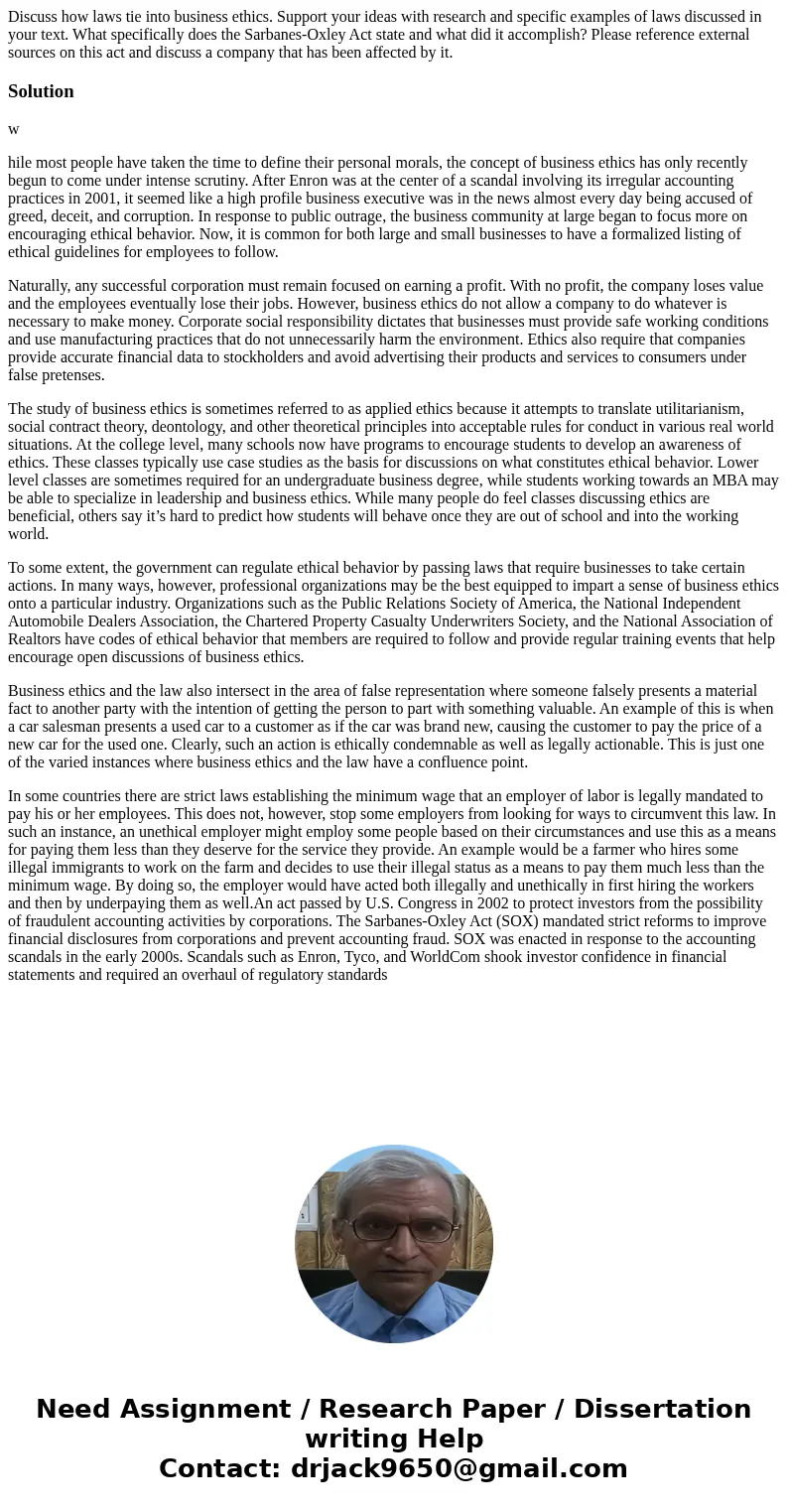Discuss how laws tie into business ethics Support your ideas
Discuss how laws tie into business ethics. Support your ideas with research and specific examples of laws discussed in your text. What specifically does the Sarbanes-Oxley Act state and what did it accomplish? Please reference external sources on this act and discuss a company that has been affected by it.
Solution
w
hile most people have taken the time to define their personal morals, the concept of business ethics has only recently begun to come under intense scrutiny. After Enron was at the center of a scandal involving its irregular accounting practices in 2001, it seemed like a high profile business executive was in the news almost every day being accused of greed, deceit, and corruption. In response to public outrage, the business community at large began to focus more on encouraging ethical behavior. Now, it is common for both large and small businesses to have a formalized listing of ethical guidelines for employees to follow.
Naturally, any successful corporation must remain focused on earning a profit. With no profit, the company loses value and the employees eventually lose their jobs. However, business ethics do not allow a company to do whatever is necessary to make money. Corporate social responsibility dictates that businesses must provide safe working conditions and use manufacturing practices that do not unnecessarily harm the environment. Ethics also require that companies provide accurate financial data to stockholders and avoid advertising their products and services to consumers under false pretenses.
The study of business ethics is sometimes referred to as applied ethics because it attempts to translate utilitarianism, social contract theory, deontology, and other theoretical principles into acceptable rules for conduct in various real world situations. At the college level, many schools now have programs to encourage students to develop an awareness of ethics. These classes typically use case studies as the basis for discussions on what constitutes ethical behavior. Lower level classes are sometimes required for an undergraduate business degree, while students working towards an MBA may be able to specialize in leadership and business ethics. While many people do feel classes discussing ethics are beneficial, others say it’s hard to predict how students will behave once they are out of school and into the working world.
To some extent, the government can regulate ethical behavior by passing laws that require businesses to take certain actions. In many ways, however, professional organizations may be the best equipped to impart a sense of business ethics onto a particular industry. Organizations such as the Public Relations Society of America, the National Independent Automobile Dealers Association, the Chartered Property Casualty Underwriters Society, and the National Association of Realtors have codes of ethical behavior that members are required to follow and provide regular training events that help encourage open discussions of business ethics.
Business ethics and the law also intersect in the area of false representation where someone falsely presents a material fact to another party with the intention of getting the person to part with something valuable. An example of this is when a car salesman presents a used car to a customer as if the car was brand new, causing the customer to pay the price of a new car for the used one. Clearly, such an action is ethically condemnable as well as legally actionable. This is just one of the varied instances where business ethics and the law have a confluence point.
In some countries there are strict laws establishing the minimum wage that an employer of labor is legally mandated to pay his or her employees. This does not, however, stop some employers from looking for ways to circumvent this law. In such an instance, an unethical employer might employ some people based on their circumstances and use this as a means for paying them less than they deserve for the service they provide. An example would be a farmer who hires some illegal immigrants to work on the farm and decides to use their illegal status as a means to pay them much less than the minimum wage. By doing so, the employer would have acted both illegally and unethically in first hiring the workers and then by underpaying them as well.An act passed by U.S. Congress in 2002 to protect investors from the possibility of fraudulent accounting activities by corporations. The Sarbanes-Oxley Act (SOX) mandated strict reforms to improve financial disclosures from corporations and prevent accounting fraud. SOX was enacted in response to the accounting scandals in the early 2000s. Scandals such as Enron, Tyco, and WorldCom shook investor confidence in financial statements and required an overhaul of regulatory standards

 Homework Sourse
Homework Sourse